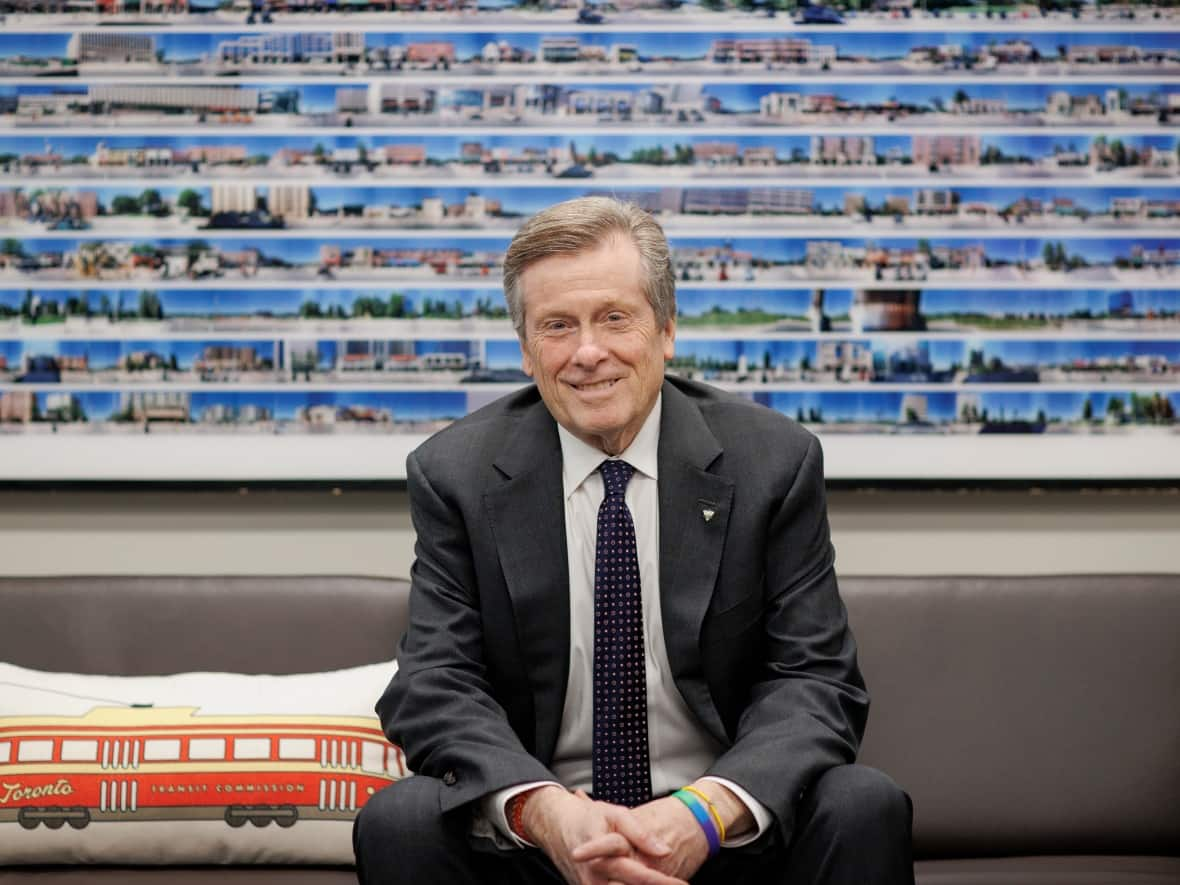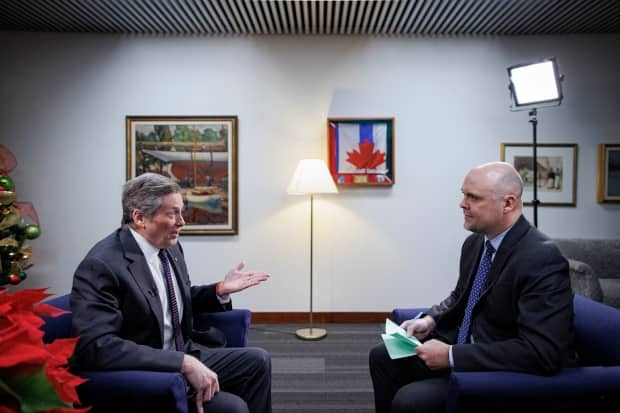Time for a bigger police budget in Toronto? Mayor Tory is vowing to push for one

Toronto Mayor John Tory says he will push to increase the city's police budget, saying inflation and a "fraying at the edges" of community safety make the move necessary.
Tory made the comments recently in a wide-ranging year-end interview with CBC Toronto. The mayor would not give specifics about the ask which will come to city council next month when budget deliberations begin in earnest. But after constraining the police budget when he was first elected in 2014, he believes it's now time to grow the services' $1.1- billion annual spending package.
"I will be advocating that (police) should get an increase, and that it's an increase that I think is entirely justifiable," Tory said. "When I go to the neighborhoods where there's been a shooting that's taken place … they want more money spent on police, they want more police officers."
Earlier this month, new Toronto Police Chief Myron Demkiw said he too would ask city council to hike the service's budget. Response times for calls are not where they should be, he said.
Tory said any increase will be done "responsibly" and within the limited funds of the city's budget, which opens the year with a $1.4-billion deficit. He stressed that a cut would not be appropriate.
"I think this year, with inflation running hard, but in particular, with some fraying at the edges with respect to community safety, that it is appropriate," he said. "(There are) levels of upset in some parts of the city that require the police have more resources to deal with."
Tory says the city is also working actively to address homelessness and in the new year more supportive housing units will be built. In addition to a city promise to add hundreds of new spaces to its shelters for the winter, these units will help the problem in the long-term, he said.
"We added 3,000 supportive housing units over the last two years, and we're going to add another 2,000 over the next couple of years," he said. "And that represents the real answer to chronic homelessness."

Tory backs review of his 'strong mayor' powers
Tory also spoke for the first time on the results of council vote this month asking the province to rescind the expanded "strong mayor" powers it granted him. Those powers, which he requested, allow him to pass some measures with a minority of support from council, something critics have called anti-democratic.
Tory said the councillors who oppose the measure have made their point. Now it's time to move on.
"If (councillors) want to carry on the debate and have it take a toll by sort of interfering with the orderly carrying on of business … they can do that," he said. "But I think that the voters will not judge that well."
But Tory said he hasn't closed the door on some kind of review of the powers, and their use, by the province near the end of his term. He backed a vote at the December council meeting calling on the province to complete a review of the strong mayor system in the coming years.
"I just think it is prudent and sensible and fair to take a provision like this that is unusual … review it and to review it before the time of the next municipal election and provincial election," he said. "So that if it needs to be changed, and that's the result of the review, then it can be changed."
Tory aims to tackle city's long-term financial woes
Tory also stressed that in the year ahead he plans to begin to sort out, once and for all, a financial arrangement that nets the city stable funding from the federal and provincial governments.
It's an issue that has bedevilled Tory almost annually, but has been more pronounced during the pandemic as the city has grappled with budget deficits ranging as high as several hundred million dollars.
"The issue is that the system is broken," he said. "It's been broken for a long time."
Toronto has limited means to raise money beyond property taxes and Tory said those should not be used to pay for massive infrastructure projects like subway extensions.
"I'm sorry to be asking for special treatment, but I don't apologize for it," he said. "I mean, I'm going say I'm sorry because it aggravates people. This city is, and it represents, a huge share of the country's economy. And so when it's not healthy, that's not good for Canada."
Tory has been criticized for not raising taxes enough over his eight years in office to help pay for many basic services provided by the city. The mayor has promised, and delivered, tax increases at or around the rate of inflation.
He doesn't believe that he's pre-conditioned Toronto's tax base to minimal tax hikes as a result.
"What we have done here is prudent financial management, the problem isn't the magnitude of the increase," he said.
Transit, housing, parks all top agenda items for final term
Tory swept back into office with 62 per cent of the vote during this fall's municipal election. The mayor has said this will be his final term in office and he's hopeful that it will give him more than enough time to shape his legacy.
"I want to get the housing built, get the transit built, keep the finances in good order, get the parks, the new parks, built, support arts and culture," he said.
"If I do all that, then I think people will say good job. Glad you're moving on, time to go. And I'll go off quite happily into the sunset."


